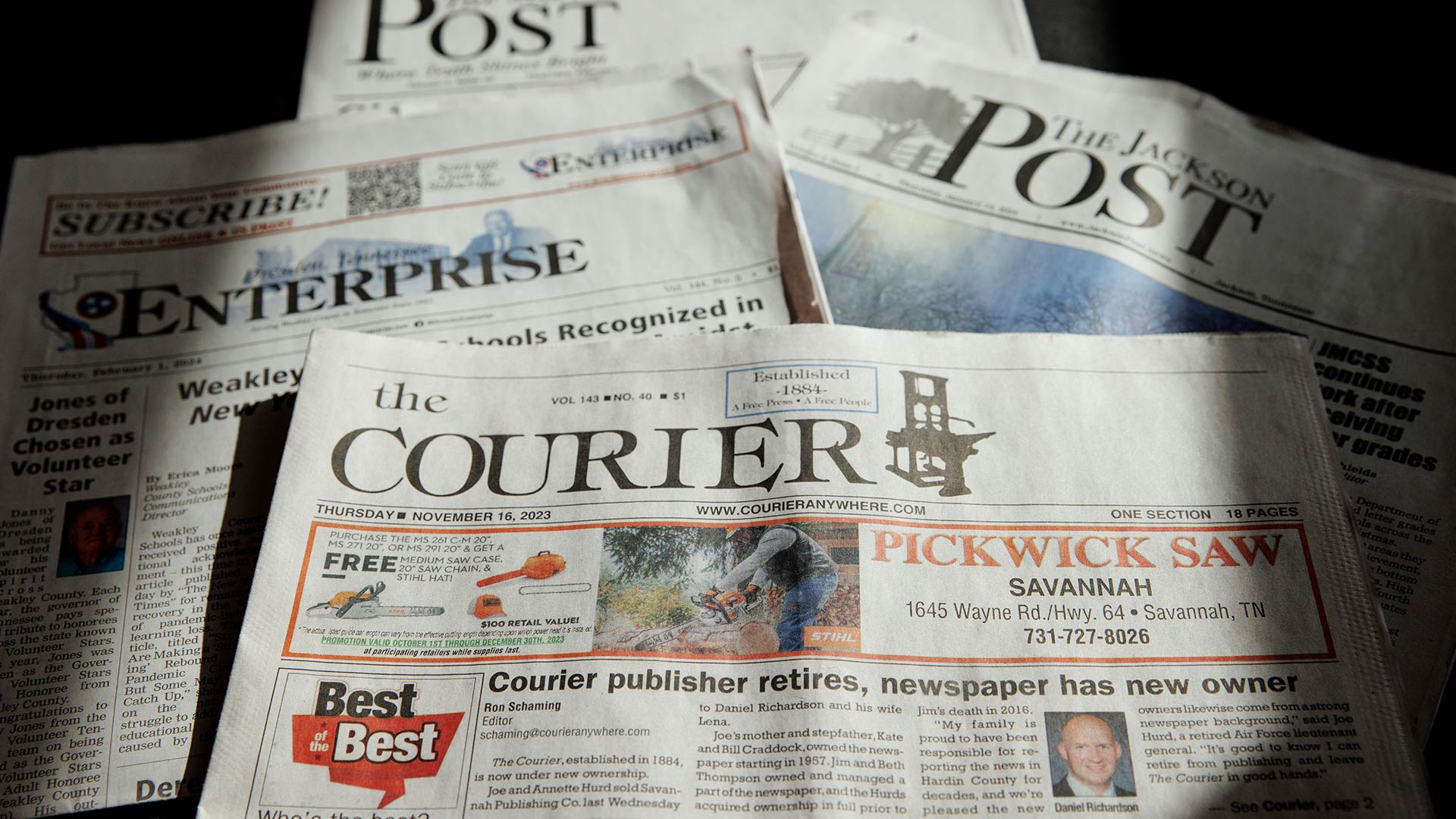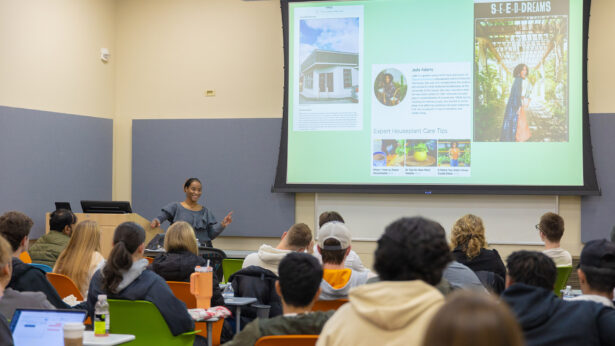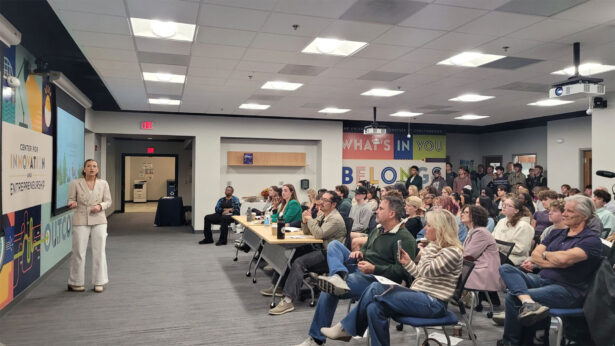In a time when small-town newspapers are being shuttered, Daniel Richardson is working to open them through his newly formed Richardson Media Group.
The 2012 UT Martin business management graduate and former CEO of Magic Valley Publishing in West Tennessee established the Richardson Media Group in November with his sights set on bolstering community media.
Richardson comes from a family of journalists. His late father, Dennis, studied journalism and communications at UT Martin before working at newspapers in West Tennessee and Middle Tennessee, including the Clarksville Leaf-Chronicle, the Weakley County Press and the Paris Post-Intelligencer. Then he bought the Carroll County News in 1983, which started Magic Valley Publishing.
Richardson’s path to opening his own media group came about through a request from a bank while Richardson was CEO of Magic Valley Publishing (MVP). Apex Bank had financed newspapers in Middle Tennessee, but the owner walked away and closed the papers: Livingston Enterprise, the Jackson County Sentinel, the Celina Citizen-Statesman, the Fentress Courier, the Shelbyville Times-Gazette and the Marshall County Tribune.
“Some had been closed for one week, and others had been closed for a month before I became involved,” he says. “Apex Bank hired me as a consultant-operator to reopen those publications and get them going, get them on their feet.”
Richardson took a two-month unpaid leave of absence in August to help some of the newspapers get back on their feet. He rehired the staffs of the newspapers that had been closed for a week and started printing them again. The newspapers that had been closed for a longer period of time provided a more difficult situation.

“I came back to my job at MVP and found that I really wasn’t able to do both,” Richardson says. “I felt that MVP could operate without me, but those other papers weren’t going to reopen without me.
“I proposed to MVP that I take two months’ unpaid leave to take care of (the newspapers), and I was going to come back on Nov. 15. Things developed, and I ended up not going back.”
About the time that talks with Apex Bank began, Richardson was talking with the Savannah Courier about buying the newspaper.
“The Courier had been for sale for several months, and I avoided the urge to consider buying it,” he says. “My dream has always been to start and grow my own publishing company, like my father had done. The big question was: When? The opportunity with Apex made me feel that it was worth taking a serious look at Savannah (the Courier).”
However, the first newspaper to come to the Richardson Media Group was The Martin Post, a newspaper Richardson and Magic Valley Publishing began in May 2023.
Shortly after beginning his leave, Richardson learned that MVP had shut that newspaper down.
“I said, ‘Well, if you’re going to shut it down, just let me buy it,’” he says.
So he reopened the paper. Its staff shares office space with the Dresden Enterprise, which Richardson also owns.
“It’s kind of been awkward with the way the whole thing was designed, for those two publications to work closely together, and then they were separated,” he says. “Everything is getting back to where it was supposed to be.
“One big reason the Post was started was because MVP already had a staff in place in Martin and an office, since the Dresden Enterprise office was leveled by the tornado in December 2021, so it made sense to share resources and have two publications.”
Richardson Media Group’s holdings now include The Martin Post, the Dresden Enterprise, the Courier (Savannah) and The Jackson Post. He hopes to bring the six newspapers he’s operating for Apex Bank into the group as well.
“We’re negotiating, and they’re for sale to the highest bidder, but I am one of those who are bidding for those,” he says.
Richardson says he wants to build up the small, community newspapers as an important part of community life.
“Everything has its ups and downs,” Richardson says. “The newspaper industry has declined from where it was 50 years ago. If that’s the comparison (that print is dead), then yes, it’s not what it used to be. Neither is network television, but they’re still in business.
“There really is something magical about the printed newspaper. I can’t even claim to understand it because I am an advocate of online news, and we have websites, and we want people to come to those sites and read the news.” Richardson’s brothers, Mark and Matthew, work with Magic Valley Publishing. As children, the boys grew up in the newspaper world.
“By the time I was at UTM, there were eight or nine publications (in Magic Valley Publishing),” Richardson says. “Some of them are up in the western Kentucky area, and those are the ones I worked at when I was in school.”
Magic Valley Publishing co-owned a printing press in Huntington with five other papers. The press also printed UT Martin’s newspaper, The Pacer, which Richardson delivered along with other newspapers.
“I just did this big, long all-night delivery route,” he says.
As a high school and college student, Richardson also worked in ad sales and began working in newspapers full-time after graduating from UT Martin.
“I started out as the editor of The Hickman County (Kentucky) Gazette,” he says. “We had two people on staff, including the editor, and he quit and started another newspaper, so that left a position open conveniently for me.”
Richardson says he enjoys the problem-solving aspect of working in the media business.
“I’m not normally involved with news coverage,” he says.
Instead, he focuses on the logistics of printing and distributing the papers and the occasional financial struggles.
“There’s always a problem to solve, and I think I’m pretty good at that. I’m pretty comfortable with this situation with Apex and starting these papers back, especially the ones that had been closed for three months,” he says. “By the time I got them going, a lot of people wouldn’t have thought that was possible. That’s the sort of thing that most people would stay away from, but I really enjoy it. I enjoy a good challenge.”
Richardson said there are several ways to get newspapers back in running condition, including an influx of capital.
“With these Apex papers, they had to have a lot of capital, but you have to have the know-how and the passion, really,” he says. “It doesn’t take near as much money as it used to, to publish a newspaper and grow it. I’d say the ‘sauce’ is the passion for the community that you serve and for journalism, to tell the story for that community.”
The newspaper also needs support from the community, and that’s something he’s seen with his papers.
“People need newspapers, but I think they also want newspapers,” he says. “Communities that have lost their newspaper understand that. Communities that haven’t generally take it for granted. You know if your grandkids are on the honor roll or if someone gets married, they’re going to be in the paper, and when you lose your newspaper, that stuff all goes away, and you want to get it back.”
It’s the simple things like weddings, deaths, honor rolls and local sports that make communities enjoy their newspapers.
“We’re not going out and getting Pulitzer Prize-winning journalism or investigative reporting and all that,” he says. “There is a potential for that, and it’s critical for that potential to be there—but that’s not what we’re about. Primarily, it’s the community news—it’s the faces and places that are in that community.”



